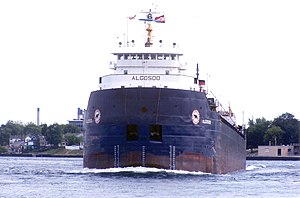Lake freighter: Difference between revisions
imported>Caesar Schinas m (Bot: Update image code) |
mNo edit summary |
||
| (One intermediate revision by one other user not shown) | |||
| Line 1: | Line 1: | ||
{{subpages}} | {{subpages}} | ||
[[File:Algosoo (St Clair River-Port Huron Mich).jpg | left | thumb | The ''[[Algosoo]]'', launched in 1974, was the last lake freighter to be constructed in the traditional 2 superstructure design, with the bridge and pilot house right in the ship's bow.]] | |||
{{Image|CSL Larentin (St Clair River Mich).jpg|right|350px| Canada Steamship Lines Larentin, upbound through the St.Clair River.}} | {{Image|CSL Larentin (St Clair River Mich).jpg|right|350px| Canada Steamship Lines Larentin, upbound through the St.Clair River.}} | ||
| Line 27: | Line 28: | ||
==References== | ==References== | ||
<references/> | <references/>[[Category:Suggestion Bot Tag]] | ||
Latest revision as of 16:00, 9 September 2024

The cargo vessels that work North America's Great Lakes are known as Lake freighters, or Lakers. The most well-known is SS Edmund Fitzgerald, the last major vessel to be wrecked on the Lakes.
Since these vessels all have to proceed through the locks of the St Lawrence Seaway they have features in common, and their appearance differs from similar sized ocean-going freighters. The are narrower. And where the superstructure of an ordinary freighters used to have the bridge in the center of the vessel, lake freighters typically had the bridge and associated superstructure right up in the bow.[1] They had a second island, over the engine room, right aft in the stern. More recently built lakers, like the seawaymax CSL Niagara, have a single large superstructure island right astern.[2]
References
- ↑ George Wharton. Great Lakes Fleet Page Vessel Feature -- American Fortitude. boatnerd. Retrieved on 2008-04-21.
- ↑ George Wharton. Great Lakes Fleet Page Vessel Feature -- CSL Niagara. boatnerd. Retrieved on 2008-04-19.
